人教版_高中英语_必修一第一单元知识总结
高中英语 人教版必修一unit1 知识要点整合
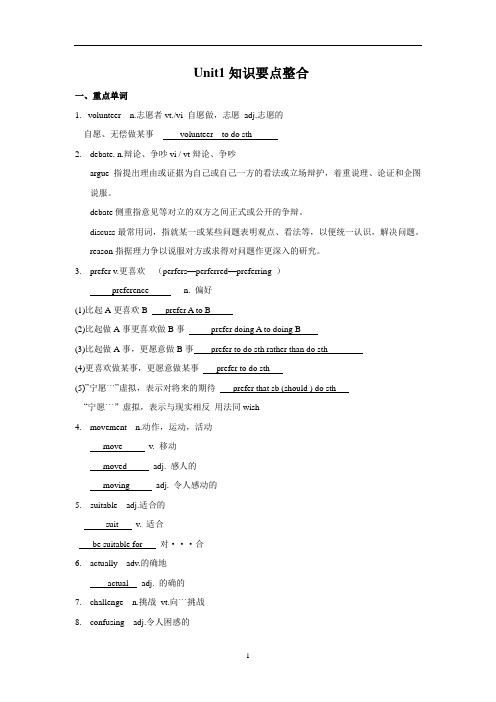
Unit1知识要点整合一、重点单词1.volunteer n.志愿者vt./vi 自愿做,志愿adj.志愿的自愿、无偿做某事volunteer to do sth2.debate. n.辩论、争吵vi / vt辩论、争吵argue指提出理由或证据为自己或自己一方的看法或立场辩护,着重说理、论证和企图说服。
debate侧重指意见等对立的双方之间正式或公开的争辩。
discuss最常用词,指就某一或某些问题表明观点、看法等,以便统一认识,解决问题。
reason指据理力争以说服对方或求得对问题作更深入的研究。
3.prefer v.更喜欢(perfers—perferred—preferring )preference n. 偏好(1)比起A更喜欢B prefer A to B(2)比起做A事更喜欢做B事prefer doing A to doing B(3)比起做A事,更愿意做B事prefer to do sth rather than do sth(4)更喜欢做某事,更愿意做某事prefer to do sth(5)”宁愿```”虚拟,表示对将来的期待prefer that sb (should ) do sth“宁愿```”虚拟,表示与现实相反用法同wish4.movement n.动作,运动,活动move v. 移动moved adj. 感人的moving adj. 令人感动的5. suitable adj.适合的suit v. 适合be suitable for 对···合6.actually adv.的确地actual adj. 的确的7.challenge n.挑战vt.向```挑战8.confusing adj.令人困惑的confused adj.感动困惑的confuse v.使···困惑confusion n..困惑8. fluent adj.流利的fluency n.流利;(1)在```很流利be fluent in9.graduate v.毕业n.毕业生graduation n.毕业(1)从```毕业__graduate from10. recommend v. 建议recommendation n.建议(1)向某人推荐、介绍``` recommend sth to/with sb(2)推荐某人做``` recommend sb for ```(3)推荐某人为``` recommend sb as ```(4)推荐某物做``` recommend sth for ```(5)建议做``` recommend doing ```(6)建议某人做``` recommend sb to do ```(7)建议``` recommend that sb (should ) do ```“一坚持,二命令,三建议,四要求”---insist/order/command/advise/suggest/recommend/ask/require/request/demand 11.advance n.进步v. 推动advanced adj.先进的,高级的in advance 事先,提前in advance of 在……前面,超过,比……进步on the advance 在上涨12.obviously adv.显然地obvious adj.显然的13. responsible adj.有责任的responsiblity n. 责任(1)对```负责___be responsible for_____14. editor n.编辑edit v.编辑15.schedule n. 工作计划,日程安排v.安排,预定(1)按时__on schedule(2)提前__ahead of schedule16.expert vi担任专家;n.专家adj.熟练的,内行的(1)在```上很内行__be expert in /be an expert in 17. behavior n.行为、动作behave v.行为17.attract v.吸引attraction n.吸引力attractive adj.有吸引力的(1吸引至```___attract to(2)吸引注意力___attract one’s attention19. addict vt. 使上瘾n.瘾君子addiction n. 上瘾addictive adj. 使人上瘾的addicted n. 上瘾的(1)对``上瘾be addicted to _20. wealth n. 财富wealthy adj. 富有的二、重点短语1. enjoy doing 喜欢做某事2. make all the difference 改变一切,大不相同3. clean up 打扫4.sign up签约sign up for 报名参加、注册5.on one’own 独自6.hand out 分发7. in the community 在社区中8. be used to doing sth 习惯于做某事9.keep up with追赶10. be prepared for 准备好```11. do well in 在```做得好12. try out for 参加```的选拔13.practice doing 练习做某事14. make the team 组队15. make a fire 生火16. learn sth from sb向某人学习```17. give a speech 做演讲18. get started 开始19. have fun 玩得开心20. focus on 集中注意力在21. encourage sb to do sth 鼓励某人做某事22. feel lonely 感到孤独23. in a good order 井然有序地24. quit doing 放弃做某事25. work out 算出,解答出26. drop out of school 辍学27. be grateful to sb for sth 对某人做某事表示感激28. be pleased to do sth 很高兴做某事29. introduce sb to sb 把某人介绍给某人30. aim to 目的在31. be the same as 和```一样32. be similar to 和```相似33. agree with sb/sth 同意某人/某事三、重点句型1. since 因为I am sure he will listen to you, since you are his good friend.2.be+adj+to dothe handwriting is easy to read.。
人教版高中英语必修1unit1课文知识点详解
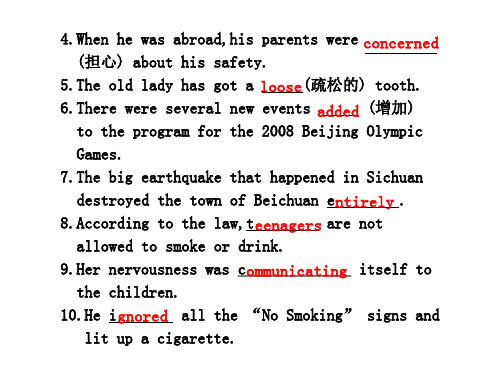
归纳总结 add v.增加,添加;补充说。 add up sth./add sth.up把……加起来 add up to加起来共计/达(不用于被动语态) add to增加,增添(后多接抽象名词) add...to...把……加到/进……里 add that...补充(说)…… 即学即用 His returning home safe and sound adds to her pleasure (使她倍感欢喜).
I’m not concerned with that matter any longer. 我和那件事再也没有关系了。 He called on all concerned to take an active part in the movement. 他呼吁所有有关的人积极地参与这场运动。 归纳总结 concern n.[U]关心,担忧;[C]关心的人(或) 事;vt.涉及,关系到,参与;(使)担心,(使)操心。 be concerned with sth.和……有关 be concerned about sth.担心/关心某事
(为此事烦恼). (2)Don’t upset yourself about it (你别为这
事烦恼了) —let’s jusern
You will tell your friend that you are concerned about him/her and you will meet after class and talk then.(回归课本P1) 观察思考 There is now considerable concern for their illness. 现在(人们)对他们的病情相当担心。 She is always concerning herself about other people’s business. 她总是关心别人的事情。
高中英语人教版必修一Unit 1 Teenage Life课本知识分类整理

高中英语必修一Unit 1 Teenage Life课本知识【重点单词拓展】1.prefer vt.较喜欢→preference n.喜爱;偏爱→preferred/preferred/preferring (过去式/过去分词/现在分词)2.recommend vt.建议;推荐;介绍→recommendation n.推荐;建议3.challenge n.挑战;艰巨任务vt.怀疑;向……挑战→challenging adj.有挑战性的→challenged adj.受到挑战的4.confuse vt.使糊涂;使迷惑→confusing adj.难以理解的;不清楚的→confused adj.糊涂的;迷惑的→confusion n.混乱;杂乱;混淆;弄错5.fluent adj.(尤指外语)流利的;熟练的→fluently adv.流利地→fluency n.流利;流畅6.advance n.前进;发展vi.前进;发展vt.发展;促进→advanced adj.高级的;高等的;先进的7.attract vt.吸引;引起……的注意(或兴趣)→attractive adj.迷人的;有吸引力的→attraction n.吸引;吸引力;有吸引力的事物8.focus vi.&vt.集中(精力、注意力等);(使)调节焦距n.中心;重点;焦点→focused adj.注意力集中的9.addict n.对……入迷的人;吸毒成瘾的人→addicted adj.有瘾的;上瘾的;入迷的→addictive adj.使人上瘾的→addiction n.上瘾;热衷10.graduate vi.&vt.毕业;获得学位n.毕业生→graduation n.毕业11.obviously adv.显然;明显地→obvious adj.明显的12.responsible adj.负责的;有责任的→responsibility n.责任;义务13.solution n.解决办法;答案→solve vt.解决14.behaviour n.行为;举止→behave vi.表现;举止规矩;(使)表现得体15.movement n.动作;运动;活动→move vt.&vi.移动;活动;搬动→movable adj.可移动的;活动的16.suitable adj.合适的;适用的→suit vt.适合17.actually adv.事实上;的确→actual adj.实际的18.survival n.生存;幸存;幸存事物→survive v.幸存→survivor n.幸存者19.volunteer n.志愿者→voluntary adj.自愿的;志愿的20.teenage adj.十几岁的(指13岁至19岁);青少年的→teenager n.(13岁至19岁之间的)青少年【课本词块和短语】P11make the / a difference 有影响;有作用extra-curricular activities 课外活动live a...life 过...的生活P12match...with 把...和....相匹配prefer doing / to do sth 更喜欢做某事prefer...to 喜欢.....多于clean up 打扫干净,清理; 解决give directions 指路make friends 交朋友suitable for 对...适合的P13add...to 把..添加到...decide to do sth 决定做某事join a club 加入俱乐部prepare for 为....做准备P14take / have a quick look at 快速浏览take courses 选课sigh up (for sth) 报名(参加课程)a way to do sth 做某事的方法on one’s own 独立地;独自make the team 加入球队a soup kitchen 施食处(为穷人免费提供食物) hand / give out 分发get / be used to doing sth 习惯于做某事be responsible for对....负责be worried about 担心/忧虑.keep up with sb跟上某人;与某人齐步前进be well prepared 做好充分准备的P15face / meet the challenge 面对挑战deal with 应付;对付;处理make a workable schedule制订可行的工作计划make a decision 作决定reading ability 阅读能力advise sb to do sth 建议某人做某事face a difficulty 面临困难P16try out for 参加..选拔/试演practise doing sth练习做某事a cheerleading team 啦啦队P17survival skills 生存技能make a fire 生火in the wild 在野外plan to do sth 打算做某事give a speech 作演讲at the same time 同时;然而P18ask for advice 征求建议play computer games 玩电脑游戏be attracted to 喜爱the online world 网络世界focus / concentrate on 集中;特别关注be addicted to 对..很人迷encourage sb to do sth鼓励某人做某事all the best 万事如意make a suggestion 提出建议P19feel lonely 感觉孤独too...to do sth 太 ...以至于不能做某事give feedback on 对...作出反馈in a good order 井然有序;按正确顺序give a reason for 给出..的原因put up 张贴搭建;举起P20pop music 流行音乐recommend...to sb推荐…给某人quit doing sth 停止/戒除做某事fall behind 不能按时完成(工作)work out 算出;解决;制订(出)the number of …的数量drop out of school辍学;退学millions of 数百万;大量be grateful for sth对....表示感谢feel like 想要have the chance / opportunity to do sth有机会做某事get a good education 受到良好的教育make the most of / make good use of充分利用make the world a better place 使世界变得更美好agree / disagree with同意/不同意solve a problem 解决问题P21set up 创立;建立;设立decide on / upon 决定;选定be pleased to do sth 高兴做某事introduce sth to sb/introduce sb to sth向某人介绍某事物aim to do sth 力求做到某事P22look through 浏览;快速查看graduate from 从...毕业have a difficult childhood 童年过得艰难a private school 私立学校grow up 长大throw away 扔掉;浪费(金钱等);放过(机会等)be similar to 与....相似be different from 与....不同【教材金句】1.Good habits formed at youth make all the difference.- Aristotle (P11)青少年时养成的好习惯能让人受益终身。
人教版高一英语必修一知识点总结五篇
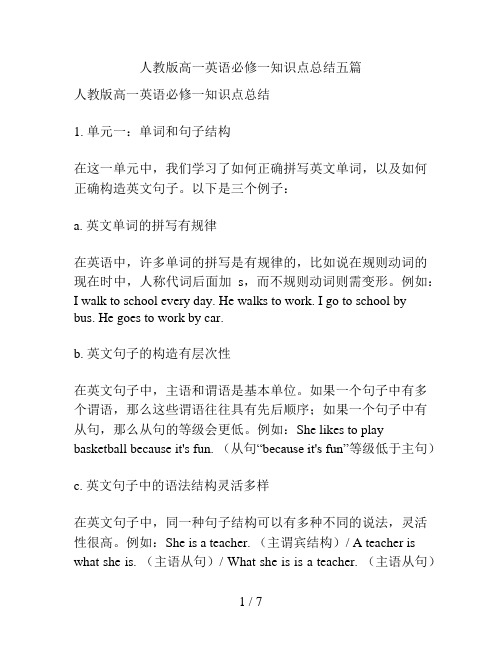
人教版高一英语必修一知识点总结五篇人教版高一英语必修一知识点总结1. 单元一:单词和句子结构在这一单元中,我们学习了如何正确拼写英文单词,以及如何正确构造英文句子。
以下是三个例子:a. 英文单词的拼写有规律在英语中,许多单词的拼写是有规律的,比如说在规则动词的现在时中,人称代词后面加s,而不规则动词则需变形。
例如:I walk to school every day. He walks to work. I go to school by bus. He goes to work by car.b. 英文句子的构造有层次性在英文句子中,主语和谓语是基本单位。
如果一个句子中有多个谓语,那么这些谓语往往具有先后顺序;如果一个句子中有从句,那么从句的等级会更低。
例如:She likes to play basketball because it's fun. (从句“because it's fun”等级低于主句)c. 英文句子中的语法结构灵活多样在英文句子中,同一种句子结构可以有多种不同的说法,灵活性很高。
例如:She is a teacher. (主谓宾结构)/ A teacher is what she is. (主语从句)/ What she is is a teacher. (主语从句)2. 单元二:课文阅读在这一单元中,我们学习了如何正确理解英文课文的内容,并提高了对英文阅读的兴趣和能力。
以下是三个例子:a. 英文课文中的语言运用丰富多样英文课文中的语言运用很丰富,包括比喻、暗示、转喻等等,需要我们认真阅读并理解。
例如:The sky was a bright shade of blue. (比喻)/ Her words cut him like a knife. (转喻)b. 英文课文中的句式多种多样英文课文中的句式也很多样,有短句和长句、简单句和复合句等等。
我们需要慢慢地理解它们,并掌握如何从中获取信息。
高中英语(新人教版)必修一知识点归纳

高中英语必修一知识点归纳Welcome Unit知识点归纳Part one Vocabulary1. exchange n.交换;交流vt.交换;交流;交易;兑换In exchange (for...)作为(与......的)交换exchange student 交换生exchange A for B 以A交换B:把A兑换成B exchange sth. with sb. 与某人交流/交换某物exchange opinions/ideas/views交流意见/想法/看法2. design1) n. 设计;图案;构思;打算,意图。
make designs for 为......做设计by design(=on purpose)故意地2) vt.设计,构思;计划;意欲。
design sth. for... 为...设计某物be designed to do... 旨在做...,用于做...3. anxious adj. 焦虑的;不安的be anxious for sb./ about sth. 为某人/某事担心be anxious for...渴望...be anxious (for sb.) to do sth. 渴望(某人)做某事be anxious that... 渴望...4. annoyed adj. 恼怒的;生气的be annoyed with sb.生某人的气be annoyed at/about sth.因某事生气be annoyed to do做...感到生气5. senior adj. 级别(或地位)高的n. 较年长的人senior high (school)高中be senior to sb. 比某人的地位/职位高6. impress vt. 使钦佩;给……留下深刻的好印象vi. 留下印象;引人注目have a(n) ...impression of... 对······有······印象leave/make a(n) ...impression on sb. 给某人留下······印象(be) under the impression that... 以为······,(通常指)误认为······7. concentrate on 集中精力于8. leave...alone 不打扰,不惊动9. explore vt.& vi. 探索;勘探exploration n. 探索,探测explorer n. 探险者;勘探者;考察者10. confident adj. 自信的;有把握的be confident about 对......有信心be confident of (doing) sth.对(做)······有把握be confident that... 确信······11. look forward to 盼望;期待12. organise vt. 组织;筹备;安排;组建vi. 组建;成立organisation n. 组织;团体;机构Part two Grammar句子成分和基本句型一、句子成分构成句子的各个部分叫作句子成分。
高一英语必修一第一单元重点语法及知识点

高一英语必修一第一单元重点语法及知识点以下是人教版高一英语必修一第一单元重点语法及知识点:- 重点词汇和短语:- add up- upset- ignore- calm down- have got to- concern- go through- set down- a series of- on purpose- in order to- at dusk- face to face- no longer- settle- suffer- recover- get/be tired of- pack- get along with- fall in love- disagree- join in- 重点句型:- It was the first time in a year and a half that I had seen the night face to face.- I wonder if it’s because I haven’t been able to be outdoors for so long that I’ve grown so crazy about everything to do with nature.- I stayed awake on purpose until half past eleven one evening in order to have a good look at the moon for once by myself.- If you have some trouble getting along with your friends, you can write to the editor and ask for advice.- Add up your score and see how many points you can get.- What he did has added to our difficulties.- His income adds up to $1000 a month.- It' s no pleasure looking through these any longer because nature is one thing that really must be experienced.- Why is she so concerned about his attitude to her work?- The police asked him to set down what he had seen in a report.- As I was about to go out and search for him, he happened to come in.- Mr. Jones lives alone and often feels lonely.- We tried to calm him down, but he kept crying.- Does he dare (to) go out at night in such stormy weather?- He would go through fire and water for his country.- That country suffered a heavy loss in the flood.- 语法总结:- 直接引语和间接引语(一)- 直接引语:直接引述别人的原话。
高中英语人教版必修一知识点总结详细
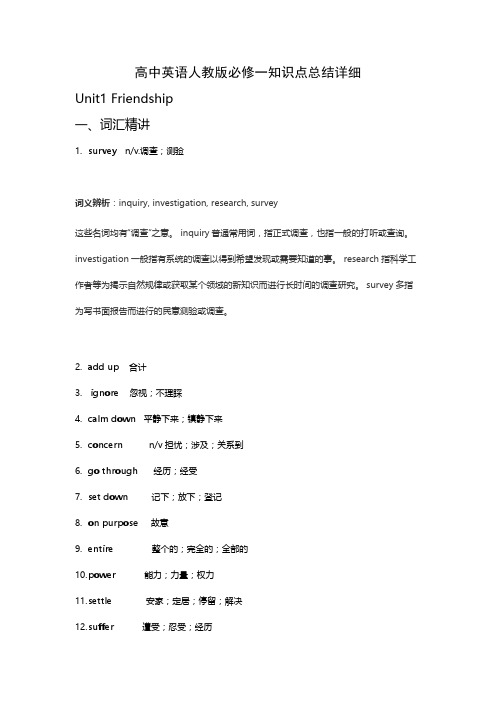
高中英语人教版必修一知识点总结详细
Unit1 Friendship
一、词汇精讲
1.survey n/v.调查;测验
词义辨析:inquiry, investigation, research, survey
这些名词均有“调查”之意。
inquiry普通常用词,指正式调查,也指一般的打听或查询。
investigation一般指有系统的调查以得到希望发现或需要知道的事。
research指科学工作者等为揭示自然规律或获取某个领域的新知识而进行长时间的调查研究。
survey多指为写书面报告而进行的民意测验或调查。
2.add up合计
3. ignore忽视;不理睬
4.calm down 平静下来;镇静下来
5.concern n/v担忧;涉及;关系到
6.go through经历;经受
7.set down 记下;放下;登记
8.on purpos e 故意
9.entire整个的;完全的;全部的
10.p ower 能力;力量;权力
11.s ettle安家;定居;停留;解决
12.s uffer遭受;忍受;经历
13.r ecover 痊愈;恢复;重新获得
14.g et along with 与.......相处;进展
15.f all in love 相爱;爱上
16.t ip n.提示;技巧;尖;尖端;小费 V.倾斜;翻到
17.s wap交换。
高一英语人教版必修第一单元知识点
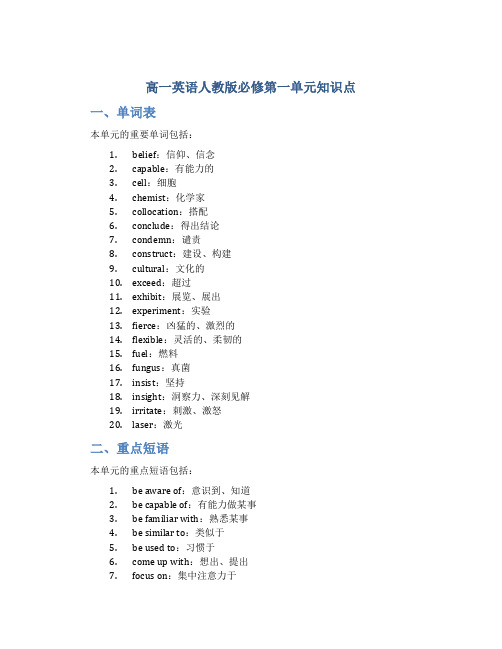
高一英语人教版必修第一单元知识点一、单词表本单元的重要单词包括:1.belief:信仰、信念2.capable:有能力的3.cell:细胞4.chemist:化学家5.collocation:搭配6.conclude:得出结论7.condemn:谴责8.construct:建设、构建9.cultural:文化的10.exceed:超过11.exhibit:展览、展出12.experiment:实验13.fierce:凶猛的、激烈的14.flexible:灵活的、柔韧的15.fuel:燃料16.fungus:真菌17.insist:坚持18.insight:洞察力、深刻见解19.irritate:刺激、激怒ser:激光二、重点短语本单元的重点短语包括:1.be aware of:意识到、知道2.be capable of:有能力做某事3.be familiar with:熟悉某事4.be similar to:类似于5.be used to:习惯于e up with:想出、提出7.focus on:集中注意力于8.have an effect on:对…产生影响9.make sense:有意义、讲得通10.play a role:发挥作用11.stick to:坚持三、重要语法点本单元的重要语法点包括:1. 句子结构英语句子的基本结构是主语(S)+动词(V)+宾语(O),但也可以有其他成分。
a) 主语主语是句子中的施动者或做动作的人或事物。
例子: - Dogs (主语) are barking loudly.(狗在大声吠叫。
) - He (主语) studies English every day.(他每天学英语。
)b) 动词动词表示主语的动作、状态或存在。
例子: - The cat (主语) is sleeping (动词) on the sofa.(猫正在沙发上睡觉。
) - She (主语) has (动词) a lot of homework to do.(她有很多作业要做。
- 1、下载文档前请自行甄别文档内容的完整性,平台不提供额外的编辑、内容补充、找答案等附加服务。
- 2、"仅部分预览"的文档,不可在线预览部分如存在完整性等问题,可反馈申请退款(可完整预览的文档不适用该条件!)。
- 3、如文档侵犯您的权益,请联系客服反馈,我们会尽快为您处理(人工客服工作时间:9:00-18:30)。
人教版必修一第一单元知识点总结
一、重点短语
1.go through经历,经受
get through通过;完成;接通电话
2.set down记下,放下
3.a series of一系列
4.on purpose有目的的
5.in order to为了
6.at dusk傍晚,黄昏时刻
7.face to face面对面
8.fall in love爱上
9.join in参加(某个活动);
take part in参加(活动)
join加入(组织,团队,并成为其中一员)
10.calm down冷静下来
11.suffer from遭受
12.be/get tired of…对…感到厌倦
13.be concerned about关心
14.get on/along well with与…相处融洽
15.be good at/do well in擅长于…
16.find it+adj.to do sth.发现做某事是…
17.no longer/not…any longer不再…
18.too much太多(后接不可数n.)
much too太…(后接adj.)
19.not…until直到…才
20.it’s no pleasure doing sth做…并不开心
21.make sb.sth.使某人成为…
make sb.do sth.使某人做某事
二、语法----直接引语和间接引语
概念:直接引语:直接引述别人的原话。
一般前后要加引号。
间接引语:用自己的话转述别人的话。
间接引语在多数情况下可构成宾语从句且
不要加引号。
例:Mr.Black said,“I’m busy.”
Mr.Black said that he was busy.
变化规则
(一)陈述句的变化规则
直接引语如果是陈述句,变为间接引语时,用连词that(可省略)引导,从句中的人称、时态、指示代词、时间状语、地点状语都要发生相应的变化。
人称的变化——人称的变化主要是要理解句子的意思
例:1.He said,“I like it very much.”→He said that he liked it very much.
2.He said to me,“I’v left my book in your room.”
→He told me that he had left his book in my room.
时态的变化
直接引语间接引语
一般现在时一般过去时
现在进行时过去进行时
现在完成时过去完成时
一般过去时过去完成时
一般将来时过去将来时
过去完成时过去完成时
例:
“I don’t want to set down a series of facts in a diary,”said Anne.
→Anne said that she didn’t want to set down a series of facts in a diary.
The boy said,“I’m using a knife.”
→The boy said that he was using a knife.
▲注意:如果直接引语是客观真理,变为间接引语时,时态不变,如:
He said,“Light travels much faster than sound.”
He said that light travels much faster than sound.
指示代词、时间状语、地点状语和动词的变化
直接引语间接引语
this that
these those
now then
ago before/earlier
today that day
yesterday the day before
tomorrow the next/following day
the day after tomorrow In two day’s time
come go
here there
the day before yesterday two days before/earlier
(二)祈使句的变化规则
如果直接引语是祈使句,变为间接引语时,要将祈使句的动词原形变为带to的不定式,并根据句子意思在不定式前加上tell/ask/order等动词,如果祈使句是否定句,在不定式前面还要加上not。
例:
The hostess said to us,“Please sit down.”
→The hostess asked us to sit down.
He said,“Don’t make so much noise,boys.”
→He told the boys not to make so much noise.
(三)疑问句的变化规则
如果直接引语是疑问句,变为间接引语时要把疑问句语序变为陈述句语序,句末用句号。
一般疑问句:如果直接引语是一般疑问句,变为间接引语时,谓语动词是say或said时,要改为ask或asked,原问句变为由if/whether引导的宾语从句。
例:“Do you think a diary can become your friend?”the writer says.
→The writer asks us if we think a diary can become our friend.
2)特殊疑问句:如果间接引语是特殊疑问句,变为间接引语时,仍用原来的引导词,但疑问句要变为陈述句。
例:
“What do you want?”he asked me.
→He asked me what I wanted。
